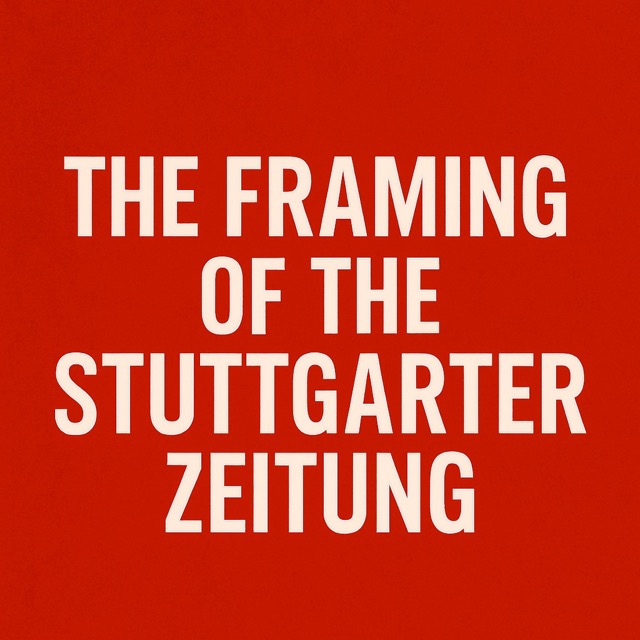For more than five years, I have been part of a public debate – first as the initiator of the first basic rights demonstrations in 2020, later as a defendant in a trial that has now exceeded 40 court sessions. During this time, I’ve learned a great deal about the power of language – and about media framing in news coverage.
The current article by Eberhard Wein in the Stuttgarter Zeitung is a prime example. At first glance, it appears objective – yet it uses language that conveys subtle judgments.

Context and Evaluation of the Article
The article discusses my crypto assets in the context of the ongoing criminal case. While much of the reporting seems restrained, the wording and framing raise concerns from a PR perspective:
- Framing through questions
The headline “Why did Michael Ballweg invest Querdenken funds in Bitcoin?” is suggestive. It implies a problematic connection – although the court has repeatedly stated that the use of cryptocurrencies is not illegal. - Contradictory portrayal of fund usage
Even though the article quotes the court saying there is no evidence of money laundering or personal enrichment, the Bitcoin investment is still framed as “highly speculative.” This introduces a risk narrative that is legally irrelevant. - Unclear terminology
The article consistently refers to “donations” – even though, legally, these were gifts. The legal treatment of gifts is much more nuanced than that of donations. This distinction is completely ignored. - Implicit bias
The phrase “Ballweg rejects monetary fine – demands acquittal” is technically correct but presented in a context that makes my stance appear irrational. In reality, a case dismissal under § 153a of the Criminal Code requires an admission of guilt – something I explicitly reject.
The Question Misleads – Not the Answer
The headline suggests a link between QUERDENKEN funds and Bitcoin investments – a link the court has never confirmed. It has repeatedly stated: There is no evidence of fraud or misuse. The use of cryptocurrencies is legally permissible – the court has made this clear multiple times. And yet, the article poses a question that implies a legal issue that simply doesn’t exist.
Framing Through Language – and What’s Missing
While the article correctly quotes the court as finding no signs of personal enrichment, it simultaneously calls the Bitcoin investment “highly speculative” – a term from financial journalism, not courtroom reporting. This creates a narrative that misrepresents the actual content of the case.
Additionally, the terminology used to describe the source of funds is misleading. These were demonstrably gifts – not donations. Gifts are not automatically tied to a specific purpose – unless the giver explicitly declares one. This important legal distinction is omitted entirely.
How I Respond to This Kind of Reporting
- Calm confidence
The article includes typical exaggerations common in journalism. A factual and transparent response by the press team was therefore the right approach. - Repeating key messages
- There is no evidence of misuse.
- The legal assessment of cryptocurrency is neutral – it’s not illegal.
- I insist on full clarification or acquittal – no deals without rehabilitation.
- The prosecution already considered dropping the case but did not pursue it for formal reasons.
- Proactive communication
Any potential increase in Bitcoin value should not be misinterpreted as “profit” – Bitcoin is volatile. - Clear language instead of speculation
Terms like “highly speculative,” “bubble,” or “alleged” should be avoided in official responses. Instead, the focus must be on documentation, transparency, and the court’s legal assessment.
History Repeats Itself
This type of reporting is not an isolated case – it follows a pattern we’ve observed since 2020. Anyone who voiced criticism of the government’s measures was publicly defamed. Not only I, but hundreds of thousands of peaceful demonstrators were dismissed wholesale – without seriously addressing their concerns.
Instead of objective analysis, media labels prevailed – in open contradiction to journalistic standards. Basic principles like verifying sources, separating opinion from reporting, and the duty of care were systematically violated. Complaints to the Press Council were ineffective, and many newsrooms backed each other up. Media self-regulation has completely failed.
And for those who think this is one-sided criticism, consider a quote from Alena Buyx – then chair of the German Ethics Council and deeply involved in pandemic management. In a 2024 panel discussion, she said:
“And by the way, you wouldn’t be exempt either. You know that very well. That would affect the media professionals just as much.” – Alena Buyx
This wasn’t an apology – it was an unintentional confirmation: the Ethics Council and much of the media were part of the problem. And they know it.
Back in 2020, our rallies on the Cannstatter Wasen were portrayed as dangerous – even though they were peaceful, decentralized, and constitutionally protected. In 2022, media coverage of my pre-trial detention focused on narrative over fact. And even today – five years later – my right to defend myself against baseless allegations is being framed in a way that fuels distrust rather than fostering clarity.
The mechanisms haven’t changed. Only the accusations have.
Read the Full Analysis
The legal team fully documented and answered all questions from the Stuttgarter Zeitung. A detailed media analysis has been published as a blog post on querdenken-711.de:
Bitcoin, Ballweg, and the Truth – What’s Really Behind the Article in the Stuttgarter Zeitung